|
|
|
Sort Order |
|
|
|
Items / Page
|
|
|
|
|
|
|
| Srl | Item |
| 1 |
ID:
073146


|
|
|
|
|
| Publication |
Hampshire, Ashgate, 2006.
|
| Description |
xvi, 234p.hbk
|
| Standard Number |
0754644812
|
|
|
|
|
|
|
|
|
|
|
|
Copies: C:1/I:0,R:0,Q:0
Circulation
| Accession# | Call# | Current Location | Status | Policy | Location |
| 051501 | 973.931/HUN 051501 | Main | On Shelf | General | |
|
|
|
|
| 2 |
ID:
132387


|
|
|
|
|
| Publication |
2014.
|
| Summary/Abstract |
Allegations of police brutality, unlawful detention, and other breaches of civil liberties during the G20 in Toronto in June 2010 provide an important case through which to understand the changing nature of security and policing, raising questions about the political implications of such shifts in terms of police accountability, transparency, and democracy. Within the field of public policing, scholars predicted that globalization processes would weaken public policing as a dominant policing institution. Instead, it has expanded, in part, through the convergence of internal and international dimensions of security, whereby new policy networks cooperate in matters of policing and security in a new integrated model, the result of which is a further militarization of urban space and expanded markets for security, leading to the securitization of everyday life. This article examines the case of Toronto's hosting of the G20 and the role that the Integrated Security Unit-led by the RCMP and including private security firms-played. By focusing on the role of multilateral networks that include private sector actors, we examine the implications of the privatization and securitization of policing for democracy, citizenship, and accountability, looking at how they affect the ability of publics to engage in public debate, to consult, or to protest policies.
|
|
|
|
|
|
|
|
|
|
|
|
|
|
|
|
| 3 |
ID:
146135


|
|
|
|
|
| Summary/Abstract |
Scholarly interest in the camp has grown over recent years, inspired in part by Giorgio Agamben's (1995; Homo Sacer: Sovereign Power and Bare Life) work. Scholarship in this area has built on Agamben's view of the camp as an abject space of exception and bare life but also, in reaction to this view, has theorized the camp as a political and social space which constitutes refugees and displaced persons as political subjects, active in demanding rights and social justice. Building on existing scholarship, this article draws attention to another important trend in the camp which has emerged alongside the growing activism of refugee populations, dissatisfied with their lack of rights and abject conditions. This is the trend of engaging refugees to become self-governing in the management of the camp, to think of the camp in terms of community development, with camp life providing the experiences through which refugees are to refashion themselves as resilient, entrepreneurial subjects. Our analysis examines this trend through the issue of humanitarian emergency governance of refugees and IDPs and within the context of reforms undertaken by the United Nations—specifically, through what we term “resiliency humanitarianism.” We use this term to suggest a particular rationale of care, camp coordination, and management which emerges within neoliberal government and which focuses on assisting refugees and IDPs to adapt to, and survive, crisis with the aim of responsibilizing them.
|
|
|
|
|
|
|
|
|
|
|
|
|
|
|
|
|
|
|
|
|